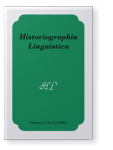Vol. 13:2/3 (1986) ► pp.281–306
Stoic syntax and semantics
The Stoic theory of loquia (lekta) contained a fairly explicit statement of formation rules. It is argued that one type of rule was called syntaxis (combination or phrase structure rule) by Chrysippus (e.g., “a subject in the nominative case and a complete predicate form a statement”). Two other types of rule were assignments of words to lexical categories (“Dion is a Noun Phrase”) and subsumption rules (“Every elementary statement is a statement”), often formulated in the form of subdivisions of concepts. A fourth type of rule seems to have been the class of transformations (enklisis, e.g., “A statement transformed by the preterite transformation is a statement”). Every syntactic rule was accompanied by a semantic interpretation according to a version of the compositionality principle familiar in modern times since Frege and elaborated by Montague and his followers. Though the concrete example of a syntax was a fairly elaborate version of some sort of Montague type or definite clause grammar, there was no effort to introduce a theory of grammar in the style of Chomsky. But the texts show awareness of the problem of the infinity of structure generated and of the concept of structural ambiguity. The Stoic system has been transformed into the formulation of the Word and Paradigm Grammar of the technical grammarians – “transformation” (enklisis) was the historical antecedent of paragôgê, declinatio, “inflection”, etc. Some formulations have survived into modern times, e.g., the notion of government, for which Stoic type formulations like “a deficient predicate can be combined with a subject in the accusative case to form a complete predicate” are a historical antecedent.
Cited by
Cited by 2 other publications
This list is based on CrossRef data as of 30 march 2024. Please note that it may not be complete. Sources presented here have been supplied by the respective publishers. Any errors therein should be reported to them.
